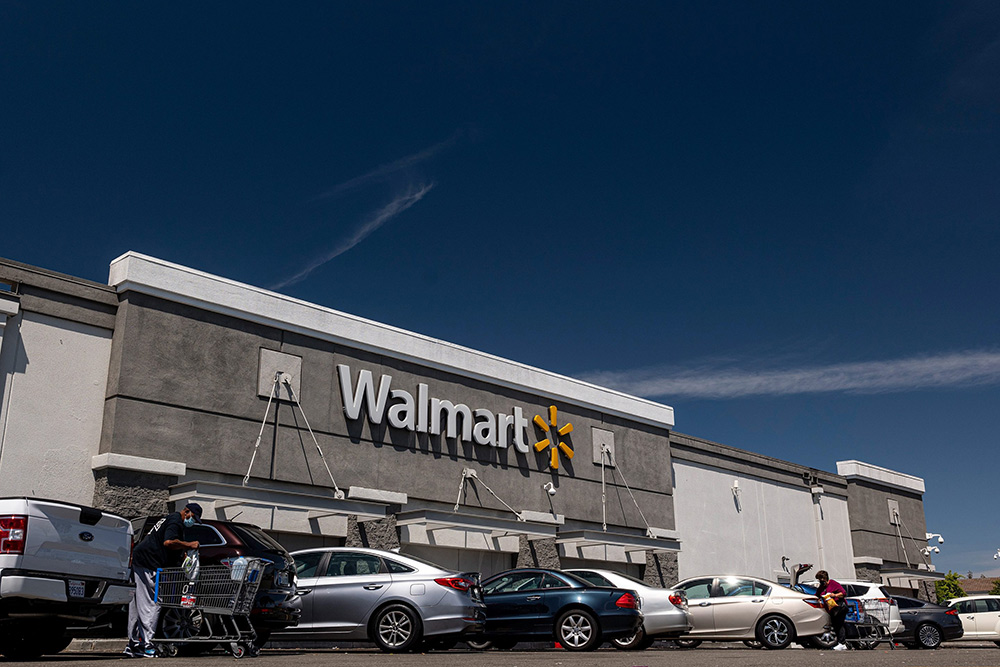
在6月初召开的年度股东大会上,沃尔玛宣布在新冠肺炎疫情期间,公司的利润创出新高。这对公司及其股东们来说当然是收获满满的一年。沃尔顿家族的个人财富增加了超过480亿美元,公司前六位高管的总薪酬接近8,000万美元。
然而,这些钱落入了高层的腰包,而新冠疫情却在基层蔓延,而且沃尔玛拒绝执行员工统一带薪病假等常识性的政策。相反,沃尔玛拒绝发放危险津贴,在戴口罩、保持社交距离和限制群聚等方面一直行动迟缓。沃尔玛没有执行防止疫情爆发的基本措施,甚至还反驳员工和客户提出的健康与安全投诉。
据United for Respect组织透露,早在疫情爆发之初,随着病毒在沃尔玛商店和仓库内传播,有22名员工死于新冠肺炎,至少在10个州有151处沃尔玛设施曝出疫情。在新墨西哥州,几乎每家门店都爆发了疫情。在俄勒冈州,由于一家门店未执行疫情防护措施,美国职业安全与健康管理局(OSHA)收到了20多条来自员工和客户的投诉。在马萨诸塞州,职业安全与健康管理局对一名沃尔玛员工的死因展开调查,但沃尔玛对此提出质疑,并且反驳了员工家属提出的赔偿,而同一家店铺内至少还有16名员工同样染疫。
因此在股东大会期间,我们呼吁由一线员工和高管组成疫情工作组,指导未来公司的公共健康响应。员工必须参与决策过程,以确保门店对客户和员工而言都是安全的,并且他们对于关乎自身利益的决策应该有发言权,包括与工资和生命保健福利等关键问题有关的决策,而且不必担心遭到打击报复。(众所周知,沃尔玛自创立至今一直反对工会,并且经常违法法律规定,阻挠员工组织工会。)
沃尔玛反对组建工作组[它曾经试图拒绝在股东大会上讨论这项提案,但美国证券交易委员会拒绝了其请求],并声称其在提高员工工资和福利、支持健康与安全以及促进种族公平方面已经做了足够多的工作。然而基层员工对沃尔玛最近宣布的这一系列进展无法苟同,而且大量关店、职业安全与健康管理局的调查和多起诉讼以及11个州与哥伦比亚特区总检察长对于其安全措施不足的批评,都意味着沃尔玛存在严重问题。
事实上,沃尔玛去年的利润付出了难以承受的代价。由于收入差距、种族歧视或语言障碍,许多沃尔玛员工在工作场所外更容易受到新冠疫情的影响。虽然沃尔玛一直拒绝公布数据证实或否认新冠疫情对其设施和员工造成的影响,但Human Impact Partners组织最近的一份报告估计,从2020年2月至2021年2月,至少有12.5万名沃尔玛员工感染了新冠病毒,超过2,000人死亡。该报告还表示,如果沃尔玛在疫情爆发之前执行了令人满意的带薪病假政策,至少有7,618人可能不会染病,至少可以挽救133个人的生命。
考虑到沃尔玛是美国最大的黑人企业雇主,该公司在疫情爆发之初不提供基本生活工资、适当的带薪病假政策和危险津贴的种种作为,与其宣传“黑人的命也是命”(Black Lives Matter)的活动形成了鲜明对比。当沃尔玛公开反对联邦政府的15美元最低时薪时,它所宣传的那些言论变得毫无意义。联邦政府的这项政策能够帮助消除结构性种族歧视。
除了种族问题以外,沃尔玛的政策让员工继续过着贫穷和不安全的生活,以此为代价赚取的利润在道德上也站不住脚跟。由于沃尔玛是美国工商业的佼佼者,因此投资者必须意识到,沃尔玛的政策不仅在伤害其自己的员工,也在影响着整个经济的健康。
研究结果已经明确告诉我们:如果企业发放基本生活工资并维护员工的安全健康,从中受益的将不只是员工本人,对于经济健康同样至关重要。如果美国的劳动者至少可以赚到15美元时薪,有能力满足医疗保健、食物和住房需求,我们整个社会都将从中受益。每10名美国人当中,无论来自任何党派,有超过7个人都能够直观地理解这一点,并且支持提高最低工资。
沃尔玛及其股东必须做出选择:继续拖后腿;或者提高工资水平,让一线员工对公司未来的发展方向有更大的发言权。经历了过去的一年,沃尔玛应该不难作出决定。(财富中文网)
本文作者威廉·J·巴伯二世现任非营利组织Repairers of the Breach的总裁兼高级讲师,并担任“穷人运动:全国道德复兴呼吁”(Poor People’s Campaign: A National Call for Moral Revival)的全国联席主席。
辛西娅·莫瑞是沃尔玛的员工兼股东,已经在沃尔玛任职20年,同时担任United for Respect组织的成员负责人。
翻译:刘进龙
审校:汪皓
在6月初召开的年度股东大会上,沃尔玛宣布在新冠肺炎疫情期间,公司的利润创出新高。这对公司及其股东们来说当然是收获满满的一年。沃尔顿家族的个人财富增加了超过480亿美元,公司前六位高管的总薪酬接近8,000万美元。
然而,这些钱落入了高层的腰包,而新冠疫情却在基层蔓延,而且沃尔玛拒绝执行员工统一带薪病假等常识性的政策。相反,沃尔玛拒绝发放危险津贴,在戴口罩、保持社交距离和限制群聚等方面一直行动迟缓。沃尔玛没有执行防止疫情爆发的基本措施,甚至还反驳员工和客户提出的健康与安全投诉。
据United for Respect组织透露,早在疫情爆发之初,随着病毒在沃尔玛商店和仓库内传播,有22名员工死于新冠肺炎,至少在10个州有151处沃尔玛设施曝出疫情。在新墨西哥州,几乎每家门店都爆发了疫情。在俄勒冈州,由于一家门店未执行疫情防护措施,美国职业安全与健康管理局(OSHA)收到了20多条来自员工和客户的投诉。在马萨诸塞州,职业安全与健康管理局对一名沃尔玛员工的死因展开调查,但沃尔玛对此提出质疑,并且反驳了员工家属提出的赔偿,而同一家店铺内至少还有16名员工同样染疫。
因此在股东大会期间,我们呼吁由一线员工和高管组成疫情工作组,指导未来公司的公共健康响应。员工必须参与决策过程,以确保门店对客户和员工而言都是安全的,并且他们对于关乎自身利益的决策应该有发言权,包括与工资和生命保健福利等关键问题有关的决策,而且不必担心遭到打击报复。(众所周知,沃尔玛自创立至今一直反对工会,并且经常违法法律规定,阻挠员工组织工会。)
沃尔玛反对组建工作组[它曾经试图拒绝在股东大会上讨论这项提案,但美国证券交易委员会拒绝了其请求],并声称其在提高员工工资和福利、支持健康与安全以及促进种族公平方面已经做了足够多的工作。然而基层员工对沃尔玛最近宣布的这一系列进展无法苟同,而且大量关店、职业安全与健康管理局的调查和多起诉讼以及11个州与哥伦比亚特区总检察长对于其安全措施不足的批评,都意味着沃尔玛存在严重问题。
事实上,沃尔玛去年的利润付出了难以承受的代价。由于收入差距、种族歧视或语言障碍,许多沃尔玛员工在工作场所外更容易受到新冠疫情的影响。虽然沃尔玛一直拒绝公布数据证实或否认新冠疫情对其设施和员工造成的影响,但Human Impact Partners组织最近的一份报告估计,从2020年2月至2021年2月,至少有12.5万名沃尔玛员工感染了新冠病毒,超过2,000人死亡。该报告还表示,如果沃尔玛在疫情爆发之前执行了令人满意的带薪病假政策,至少有7,618人可能不会染病,至少可以挽救133个人的生命。
考虑到沃尔玛是美国最大的黑人企业雇主,该公司在疫情爆发之初不提供基本生活工资、适当的带薪病假政策和危险津贴的种种作为,与其宣传“黑人的命也是命”(Black Lives Matter)的活动形成了鲜明对比。当沃尔玛公开反对联邦政府的15美元最低时薪时,它所宣传的那些言论变得毫无意义。联邦政府的这项政策能够帮助消除结构性种族歧视。
除了种族问题以外,沃尔玛的政策让员工继续过着贫穷和不安全的生活,以此为代价赚取的利润在道德上也站不住脚跟。由于沃尔玛是美国工商业的佼佼者,因此投资者必须意识到,沃尔玛的政策不仅在伤害其自己的员工,也在影响着整个经济的健康。
研究结果已经明确告诉我们:如果企业发放基本生活工资并维护员工的安全健康,从中受益的将不只是员工本人,对于经济健康同样至关重要。如果美国的劳动者至少可以赚到15美元时薪,有能力满足医疗保健、食物和住房需求,我们整个社会都将从中受益。每10名美国人当中,无论来自任何党派,有超过7个人都能够直观地理解这一点,并且支持提高最低工资。
沃尔玛及其股东必须做出选择:继续拖后腿;或者提高工资水平,让一线员工对公司未来的发展方向有更大的发言权。经历了过去的一年,沃尔玛应该不难作出决定。(财富中文网)
本文作者威廉·J·巴伯二世现任非营利组织Repairers of the Breach的总裁兼高级讲师,并担任“穷人运动:全国道德复兴呼吁”(Poor People’s Campaign: A National Call for Moral Revival)的全国联席主席。
辛西娅·莫瑞是沃尔玛的员工兼股东,已经在沃尔玛任职20年,同时担任United for Respect组织的成员负责人。
翻译:刘进龙
审校:汪皓
At early June, at its annual shareholders meeting, Walmart celebrated the record profits it raked in during the pandemic. It certainly was a good year for the company and its owners. The Walton family saw their personal wealth increase by over $48 billion, and the company’s top six executives saw their total compensation reach nearly $80 million.
As money flowed to the top of the company, though, the coronavirus pandemic spread across the bottom, and Walmart refused to institute commonsense policies like universal paid sick leave for its workers. Instead, it stiffed them on hazard pay and dragged its feet on masks, distancing, and limiting crowds. The company failed to take basic actions to stem outbreaks and even pushed back against health and safety complaints from workers and customers.
Early in the pandemic, 22 employees died of COVID-19 and, as the virus spread throughout its stores and warehouses, at least 151 Walmart facilities in 10 states reported outbreaks, according to United for Respect. In New Mexico, COVID-19 hit nearly every store. In Oregon, over 20 OSHA complaints were filed by workers and customers about one store’s lack of COVID-19 safeguards. In Massachusetts, Walmart challenged an OSHA investigation into the death of one of its associates and contested her family’s claim for workers’ compensation, while at least 16 other workers also contracted COVID-19 at the same store.
This is why during the shareholder meeting, we called for the creation of a pandemic task force: a committee made up of frontline associates and executives to guide the company’s public health response moving forward. Workers need to be part of the decision-making process to make sure stores are safe for customers and employees and to have a say in shaping policies that affect them, including those related to critical issues like wages and lifesaving benefits, without fear of retaliation. (Walmart has been notoriously anti-union since its founding and has routinely broken the law to keep employees from organizing.)
Walmart has opposed the creation of a task force (it attempted to exclude the proposal from the shareholder meeting, but the Securities and Exchange Commission declined the request), claiming it is already doing enough to improve wages and benefits, support health and safety, and advance racial equity. But for workers on the ground, the company’s recent announcements on progress are riddled with fine print, and Walmart’s numerous store closures, OSHA investigations, and multiple lawsuits, as well as criticism of inadequate safety measures from the attorneys general of 11 states and the District of Columbia, point to gaping problems.
Indeed, the profits that Walmart made over the past year came at an unbearable cost. Many of Walmart’s workers were already vulnerable to COVID-19 outside of the workplace, due to income disparities, racial discrimination, or language barriers. Although the company has refused to publicly release any data to confirm or deny the toll of the virus on its own facilities and employees, a recent report from Human Impact Partners estimates that at least 125,000 Walmart employees contracted COVID-19 between February 2020 and February 2021, with over 2,000 deaths among its associates. The report also shows that if Walmart had an adequate paid sick leave policy in place before the pandemic hit, at least 7,618 people probably would not have become sick and at least 133 lives could have been saved.
Given that the company is the largest corporate employer of America’s Black workforce, its failure to provide living wages, adequate paid sick leave, and hazard pay early on in the pandemic stands in stark contrast to the company’s public campaign saying “Black Lives Matter.” These words are meaningless when Walmart openly campaigns against a federal $15 minimum wage, a concrete policy that would help undo structural racism.
Beyond the racial component, it is morally indefensible for Walmart to profit from policies that keep its workers poor and unsafe. Given the company’s leading position in American business, investors must realize that these policies are not just hurting workers; they’re impacting the health of the economy as a whole.
The research is clear: Living wages and a safe and healthy workforce are not only right for workers, but also for a healthy economy. When workers in this country are able to earn at least a $15 wage and to afford health care, food, and housing, our entire society benefits. More than seven in 10 Americans across both political parties intuitively understand this and support a minimum wage increase.
Walmart and its shareholders have a clear choice: continue to drag their feet, or raise wages and give frontline workers a stronger voice in shaping the direction of the company. After the year we’ve had, this shouldn’t be a hard decision.
William J. Barber II is president and senior lecturer of Repairers of the Breach and the national cochair of the Poor People’s Campaign: A National Call for Moral Revival.
Cynthia Murray is a 20-year Walmart associate and shareholder, and member leader of United for Respect.






